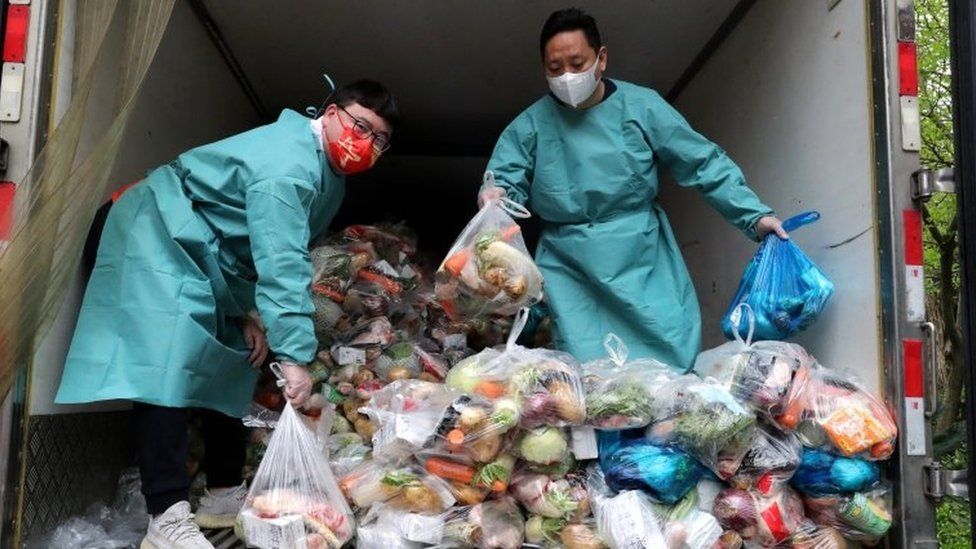Some residents under lockdown in Shanghai say they are running out of food, amid the city’s biggest-ever Covid outbreak.
Residents are confined to their homes, banned from leaving for even essential reasons such as grocery shopping.
Nearly 20,000 cases were reported on Thursday in China’s biggest city – another near-record high.
Officials have admitted the city is facing “difficulties” but say they are trying to improve this.
But public anger is also being stoked by other drastic measures – such as the removal of children from their parents if they test positive.
Shanghai officials later responded by allowing parents who were also infected to accompany their children to isolation centres.
However, according to a Reuters report, there are still complaints over children separated from parents who were not Covid-positive.
 IMAGE SOURCE,GETTY IMAGES
IMAGE SOURCE,GETTY IMAGESThe city began another round of mandatory mass testing on Wednesday to identify and isolate every case.
Shanghai residents who test positive can’t isolate in their homes even if their conditions are mild or asymptomatic.
They have to go to mandatory quarantine facilities, which critics say have become crowded and have sub-par conditions.
Why is there a food shortage?
When Omicron first emerged in Shanghai a month ago, the city quarantined only certain compounds. Then as the virus spread officials last week implemented a staggered lockdown where the city was split into two and each half had separate measures.
On Monday the lockdown was extended indefinitely to cover the entire city of 25 million people.
Strict rules mean most people have to order in food and water and wait for government drop-offs of vegetables, meat and eggs.
But the lockdown extension has overwhelmed delivery services, grocery shop websites and even the distribution of government supplies.
Many delivery personnel are also in locked-down areas, leading to an overall decrease in delivery capacity.
Locals in some areas of the city say they’ve been completely cut off.
“Please solve the problem of insufficient delivery capacity as soon as possible,” one user wrote on social media site Weibo in response to city officials’ video message.
Another person wrote that it was the “first time in my life that I have gone hungry”.

Residents have also raised other concerns about price gouging, and how elderly or less tech-savvy residents are surviving.
City officials acknowledged the food struggles on Wednesday, saying Shanghai had enough supplies of rice, noodles, grain, oil and meat but there were delays in distributing them.
“It is true there are some difficulties in ensuring the supply of daily necessities,” said Liu Min, the deputy director of the Shanghai Municipal Commission of Commerce.
On Thursday, Shanghai’s vice mayor added the city would try to re-open some wholesale markets and food stores, and allow more delivery personnel out of locked-down areas.
“We have been holding meetings overnight to try and figure out solutions,” said Chen Tong.
 IMAGE SOURCE,GETTY IMAGES
IMAGE SOURCE,GETTY IMAGESChina is one of the last remaining nations still committed to eradicating Covid, in contrast to most of the world which is trying to live with the virus in its Omicron variation.
The country has successfully enacted full lockdowns before – endured by millions of people in cities including Xi’an and Wuhan – but Shanghai is its biggest city and the case spread this time is much higher than previous outbreaks.
As one of the economic powerhouses of China, Shanghai’s shutdown is also fuelling concerns about the impact to China and the world’s economy.



